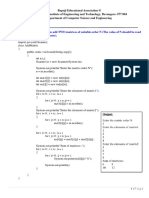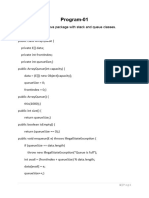0% found this document useful (0 votes)
28 views13 pagesLabbbb
The document contains multiple Java classes demonstrating various programming concepts such as matrix addition, stack operations, employee salary management, point manipulation, shape drawing, area and perimeter calculations, resizing shapes, inner classes, custom exceptions, and package usage. Each class includes a main method for testing its functionality. The document serves as a comprehensive overview of object-oriented programming principles in Java.
Uploaded by
madhu01sklCopyright
© © All Rights Reserved
We take content rights seriously. If you suspect this is your content, claim it here.
Available Formats
Download as TXT, PDF, TXT or read online on Scribd
0% found this document useful (0 votes)
28 views13 pagesLabbbb
The document contains multiple Java classes demonstrating various programming concepts such as matrix addition, stack operations, employee salary management, point manipulation, shape drawing, area and perimeter calculations, resizing shapes, inner classes, custom exceptions, and package usage. Each class includes a main method for testing its functionality. The document serves as a comprehensive overview of object-oriented programming principles in Java.
Uploaded by
madhu01sklCopyright
© © All Rights Reserved
We take content rights seriously. If you suspect this is your content, claim it here.
Available Formats
Download as TXT, PDF, TXT or read online on Scribd
/ 13




























































































